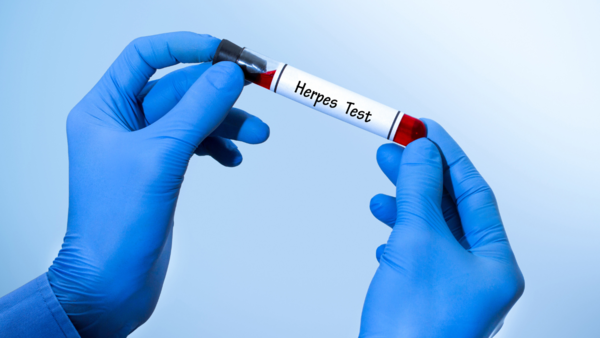Are you getting
sores
in your genital or oral areas? If so, it might be a sign of herpes, commonly known as the
herpes
simplex virus (HSV), which causes cold sores or blisters in the mouth or genital area. While there is no cure for herpes, antiviral drugs and home treatments can significantly reduce symptoms.
Genital herpes is a sexually transmitted infection (STI). Genital herpes is commonly shared through vaginal, oral, or anal intercourse. One in every five women aged 14 to 49 has genital herpes.1 There is no treatment for herpes. However, you can take medication to prevent outbreaks and reduce your chance of transmitting genital herpes to your partner.
Approximately 67% of the global population under the age of 50 is at risk of developing oral or genital herpes. While HSV-1 is more frequent among herpes viruses, roughly 13% of the population aged 15 to 49 is more likely to get HSV-2.
Causes of genital herpes
According to Dr. Archana Dhawan Bajaj, Gynecologist, Obstetrician, and IVF Expert, Nurture IVF Clinic, New Delhi, “The common risk factors include sexual contact with someone infected with hsv-1 or hsv-2, oral, anal, or vaginal sex without barrier protection (condom, dental dam), multiple sexual partners, anonymous sexual partners, and the presence or history of another sexually transmitted or blood-borne infection. Females are more likely to get genital herpes from their male partners than vice versa. Studies on heterosexual couples with one spouse who had symptomatic recurrent genital HSV-2 (“source partner”) indicated yearly transmission rates of 11-17% in couples with male source partners and 3-4% in couples with female source partners.”
Diagnosis of genital herpes
Dr. Sunita Kapoor, Director and Laboratory Head, City X-Ray and Scan Clinic Pvt.Ltd. says, “Early detection of herpes simplex virus (HSV) through screening tests like viral culture tests, herpes PCR, antibody tests, and antigen tests can significantly improve patient outcomes. Identifying the infection early allows for timely intervention, better management, and improved quality of life.
A viral culture test for detection of the herpes simplex virus involves collecting cells from a fresh sore or lesion and growing them in a lab. This process allows to determine if HSV is present. While highly specific, this test is most effective when performed during the early stages of an active infection when the virus is actively replicating. The PCR test is an important tool in the identification of the genetic material (DNA) of HSV in a sample. This test is highly sensitive and can detect even minute amounts of viral DNA. Furthermore, blood tests for HSV antibodies identify HSV-specific antibodies produced by the immune system in response to an infection. This test can distinguish between the two major types of HSV. HSV-1 antibodies are typically associated with oral herpes, and HSV-2 antibodies are primarily associated with genital herpes. Antigen tests for herpes identify specific HSV antigens from a lesion or sore. Out of all the tests, PCR and HSV antibody detection are more commonly used . ”
Tips to prevent herpes
Any sort of unprotected vaginal, anal, or oral-genital intercourse can spread herpes. The only effective way to prevent herpes is abstinence or persistent and proper condom usage. However, even condoms are not without risk, as lesions can arise outside of the condom-protected region.
During an outbreak, the risk of transmission is highest. Experts recommend that people avoid sex while they have symptoms and use condoms between outbreaks. Because oral herpes can be transmitted to the genitals through oral contact, it is best to avoid oral intercourse if there is a cold sore.
Women might cover the vulva with dental dams or plastic wrap to keep their partners from coming into contact with bodily fluids during oral sex.
Lesbians or bisexual women should be aware that the herpes virus can be spread when a woman’s lesion comes into contact with her female partner’s oral or vaginal mucosa.
If you have an outbreak, keep the affected area clean and dry to avoid secondary infections from occurring. Avoid touching sores and wash your hands after any contact with them. Avoid sexual contact until the sores are entirely healed (scabs have come off and fresh skin has grown over the blemishes).
People with early signs of a herpes outbreak or with visible sores should not have sex until the sores have healed completely.
Avoid sharing towels, toothbrushes, lip balm, or lipstick to prevent spreading sores. If you experience frequent outbreaks, daily antiviral medication can reduce the risk of transmission to your partner.
Taking care of your overall health can also help minimize outbreaks. Eat a balanced diet, get enough sleep to support your immune system, and manage stress, as it can weaken your body’s defenses.
Protect yourself from harsh weather conditions like sun, wind, extreme heat, or cold by using sunscreen and lip balm.
Additionally, consult your healthcare provider about antiviral medications to help keep outbreaks under control.
Drug for rare disorder shows promise for treating herpes viruses
I’m Manas Ranjan Sahoo: Founder of “Webtirety Software”. I’m a Full-time Software Professional and an aspiring entrepreneur, dedicated to growing this platform as large as possible. I love to Write Blogs on Software, Mobile applications, Web Technology, eCommerce, SEO, and about My experience with Life.





